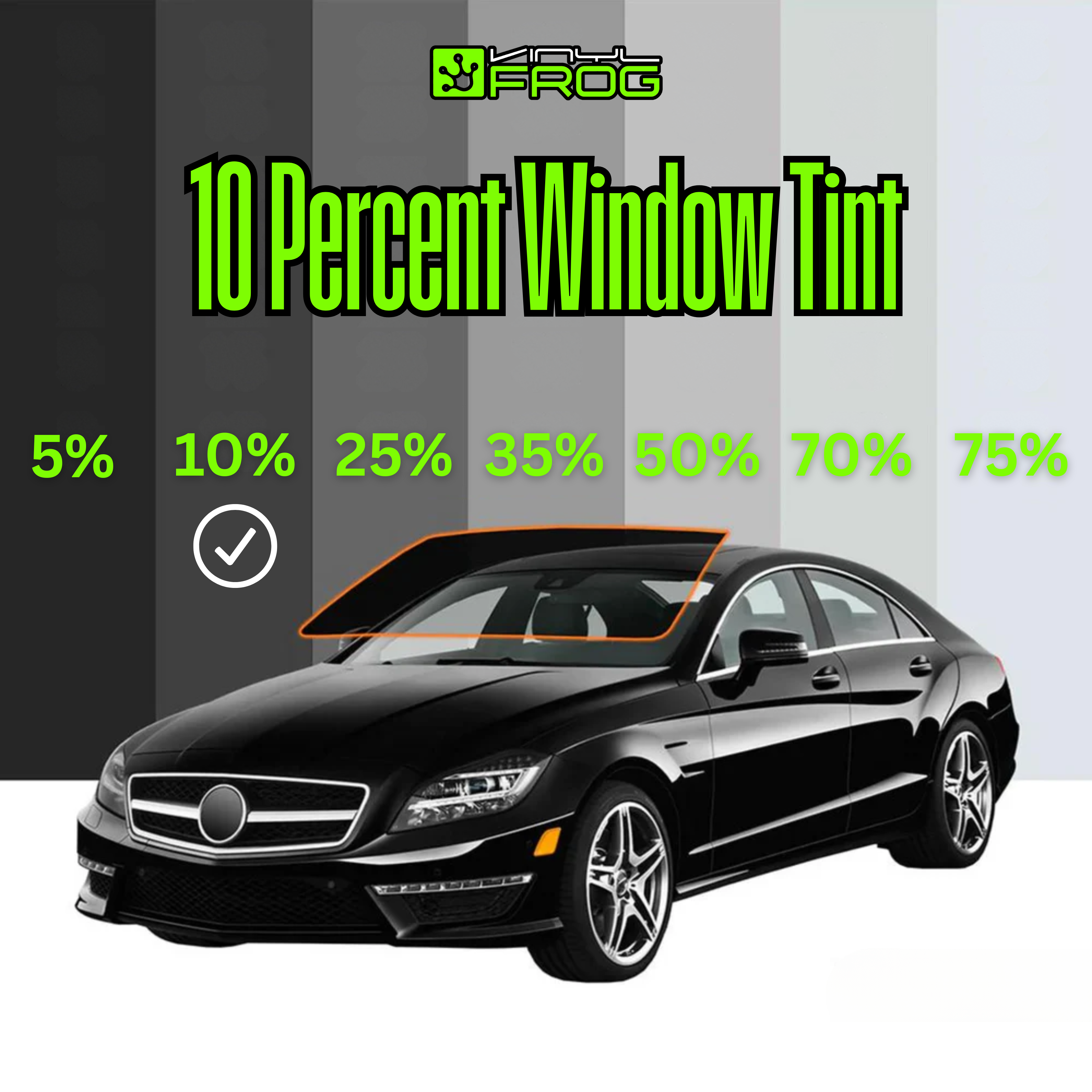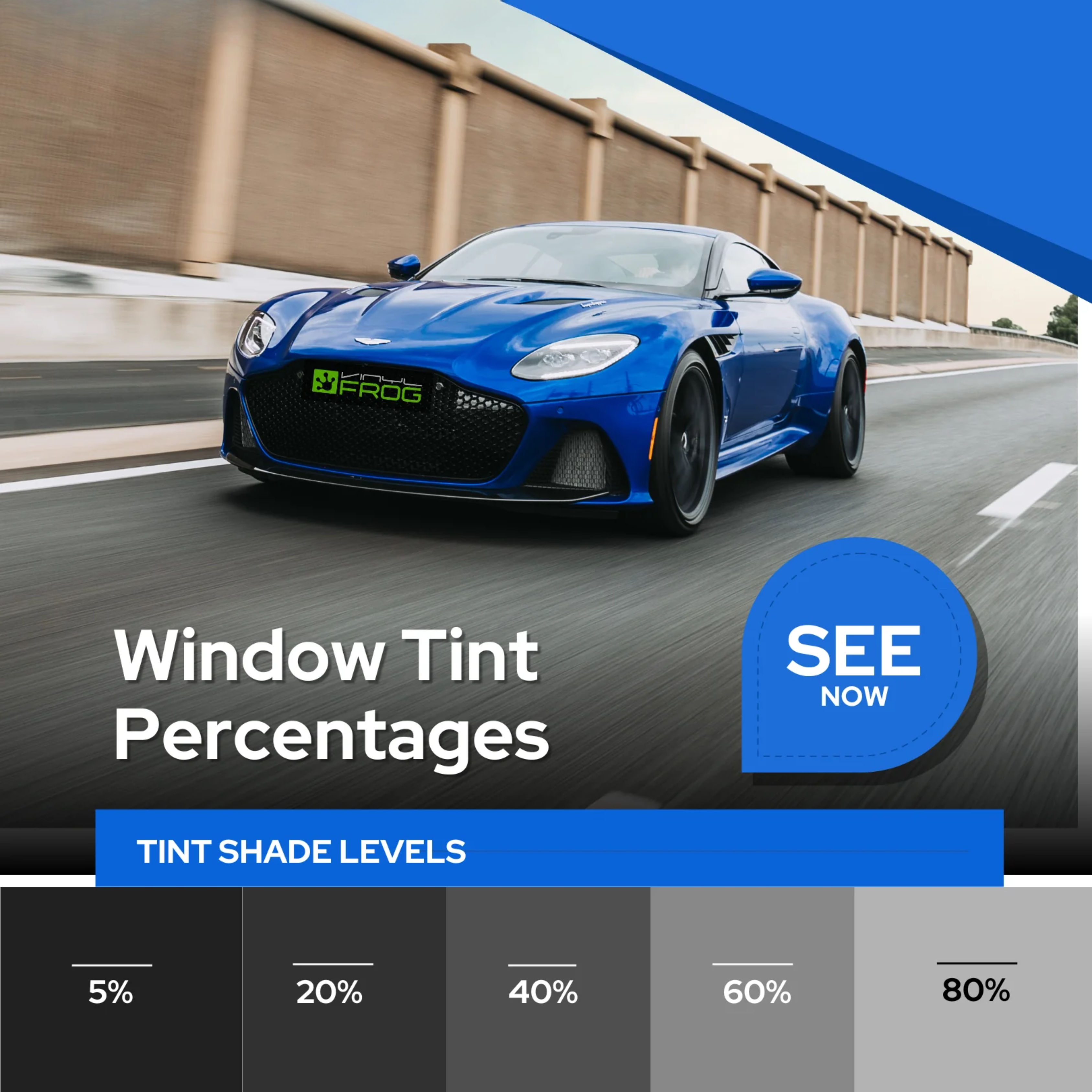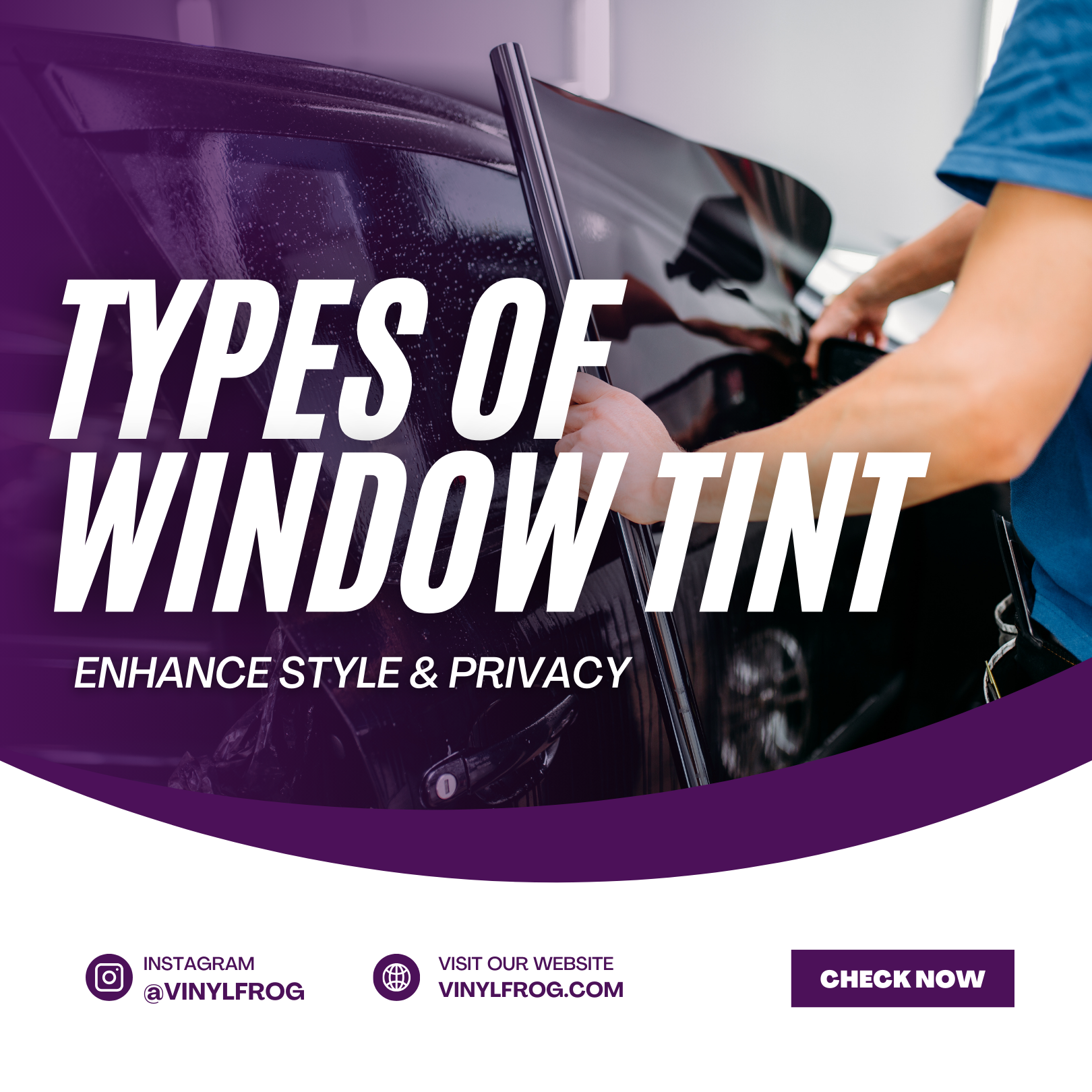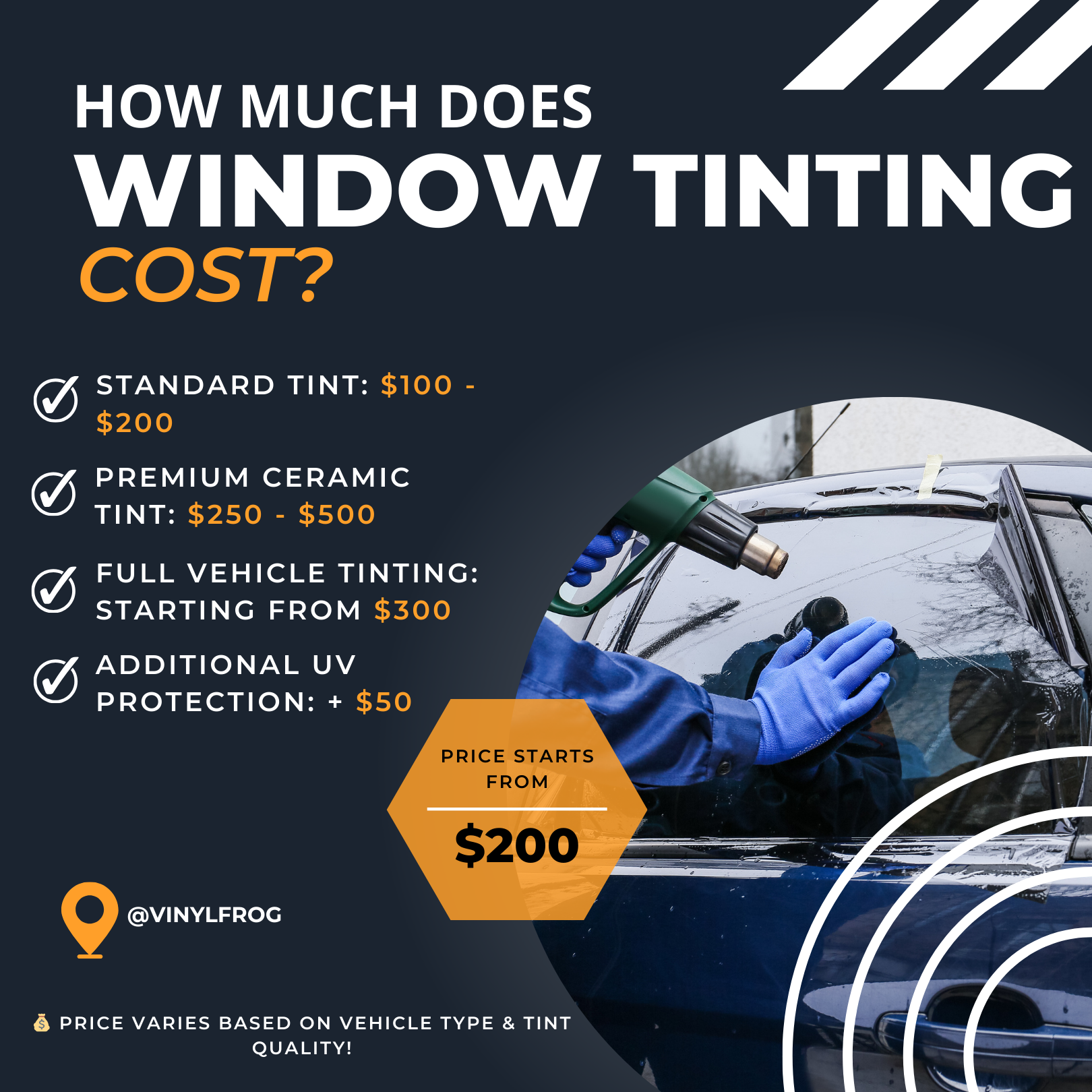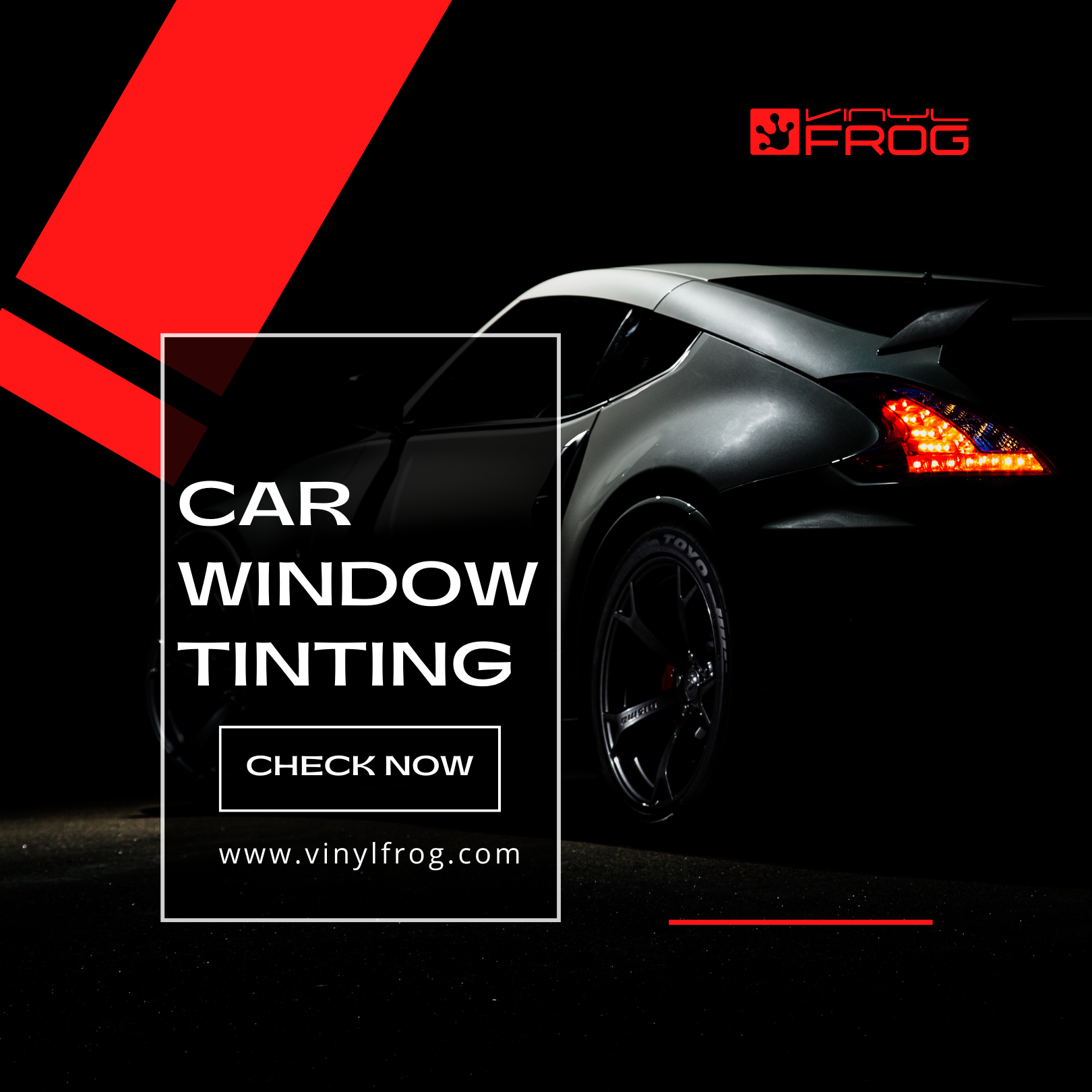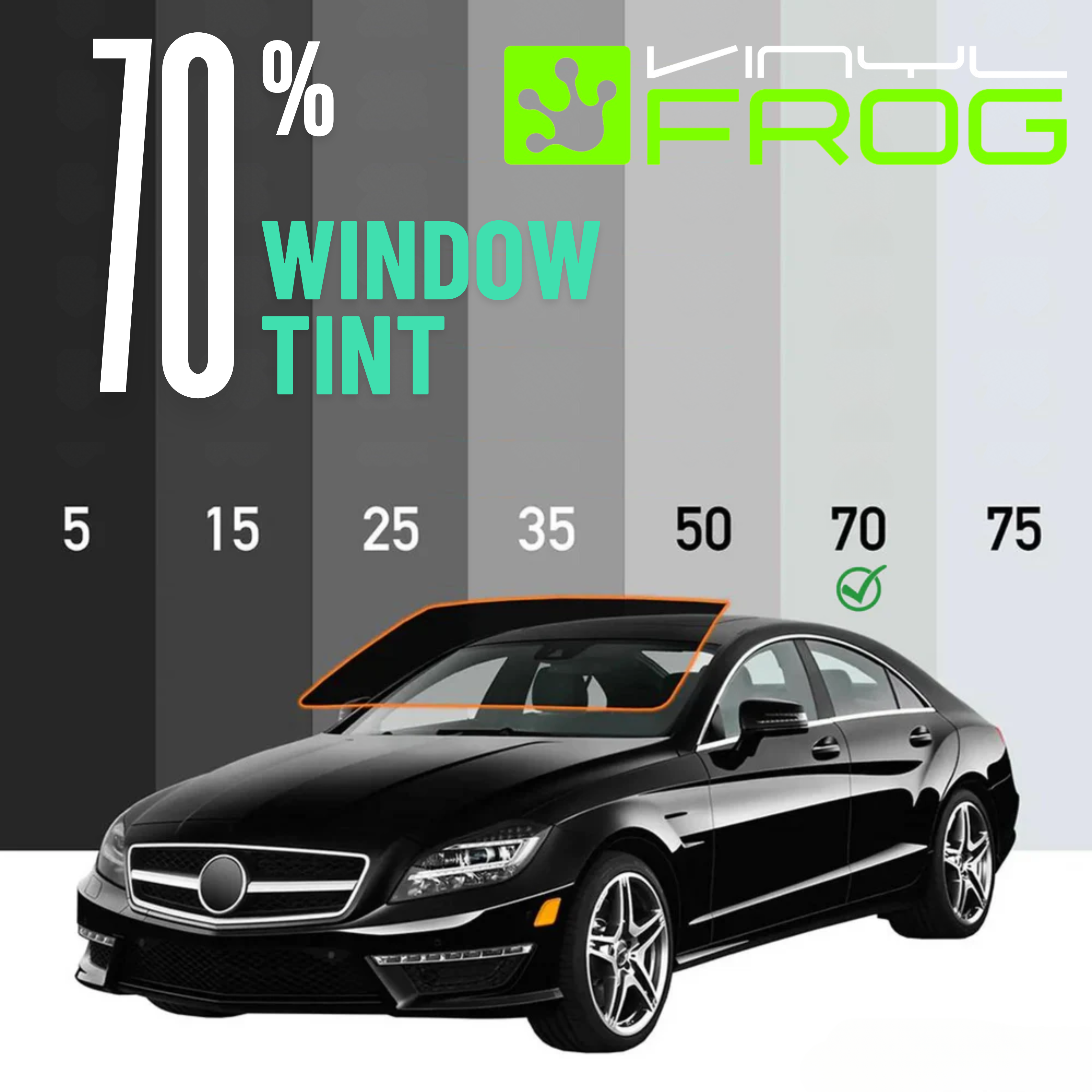Updated By Vinyl Frog On April 23, 2025
Ceramic Tint vs Regular Tint

When it comes to automotive window tinting, the choices can be overwhelming. Among the multitude of options available, two popular contenders stand out: Ceramic tint and regular tint. Understanding the differences between these two types of window tinting is crucial for making an informed decision that suits your needs.
Whether you're looking for improved heat rejection, enhanced privacy, or protection against harmful UV rays, selecting the right tint can significantly impact your driving experience.
In this comprehensive guide, we will explore the features, benefits, and drawbacks of both the ceramic and regular tint, helping you navigate the decision-making process with confidence. So, let's dive in and uncover the key factors that will help you choose the perfect window tint for your vehicle.
What Is A Regular Tint?
Regular tint, also known as traditional, dyed or standard tint, has been the most common type of window tint material for many years. It is typically made of sheets of window film that are dyed in various colors. These sheets are usually constructed from polyester or other laminate materials.

Regular tint comes in different shades, ranging from light to dark, providing varying levels of window tinting. The most popular shade is black, although it is also available in shades of gray and brown. The darkness of the tint is measured in gradations, which range from about
Lower percentages represent darker shades. The main purpose of the regular window tint film is to block sunlight and add privacy to vehicles. It acts as a form of sunglasses for windows and other glass surfaces, reducing the amount of sunlight that enters while providing privacy to the interior.
What Is A Ceramic Tint?
Ceramic tint is a type of tint film that has emerged as a result of advancements in the window tinting technology. Similar to regular tint, ceramic tints are typically made from sheets of polyester or laminate material and are available in various shades and colors.
However, the key distinction lies in the additional coating of ceramic particles applied to the film during the manufacturing process. This ceramic coating enhances the performance of the tint by providing superior blocking of visible sunlight, UV rays, glare, and heat.
Ceramic tints are at the top notch. They offer improved heat rejection and UV protection compared to the regular tint, making them an excellent choice for those seeking enhanced performance and comfort for their windows.
Ceramic Tint vs Regular Tint: Which Is The Superior Window Film?
Ceramic window tint offers significant advantages over regular tint, making it the superior choice for many car owners. Regular tinting has several drawbacks. Let’s see the differences in detail:

Durability And Performance
Firstly, regular tint is less durable than the ceramic one, as the anti-scratch coating on regular tints breaks down over time, requiring frequent re-tinting. Though it is a popular and cost-effective option, it has a shorter lifespan compared to other types of window tints. Regular tint films are made by adding a layer of dye to the adhesive or the polyester film itself. While this dye provides the desired tint color and can reduce glare, it is more susceptible to fading and discoloration over time.
Exposure to sunlight, UV rays, and harsh weather conditions can cause the dye to deteriorate and the tint to fade, resulting in a less appealing appearance. Hence it is generally not as durable as higher-quality options like ceramic films.
In contrast, the ceramic tint is highly durable and maintains its quality without signs of wear. It is manufactured using advanced nano-ceramic technology which makes it resistant to fading, discoloration, and damage from UV rays. Ceramic tint also has excellent heat-rejection properties without interfering with electronic signals.
Its durability allows it to maintain its performance and appearance over an extended period. With proper installation and care, ceramic tint can provide long-lasting results, often more than other types of tint films. While it may come at a higher cost, the enhanced durability of ceramic tint makes it a popular choice for those seeking superior performance and longevity.
Protection Against UV Rays
Another drawback of regular tint is its limited protection against UV rays and heat. While it adds privacy and reduces sun glare, regular dyed tint does not effectively block the damaging ultraviolet beams or prevent the build-up of heat inside the car. This can lead to damage to the car's interior, especially if the vehicle is frequently exposed to sunlight.

The dye used in the regular tint absorbs a portion of the UV radiation, helping to reduce its penetration into the vehicle. However, over time, the dye can degrade and lose its effectiveness, resulting in decreased UV protection. Additionally, dyed tint primarily reduces the heat and glare from sunlight, rather than focusing on UV blockage.
Ceramic tint, on the other hand, offers superior UV protection and heat rejection. It prevents 99% of UV rays from entering the car, preserving the interior and providing a cooler and more comfortable driving experience. It is designed with ceramic particles infused within the film that help to block and absorb a significant amount of harmful UV radiation.
Glare Reduction
If you want glare reduction, do not expect much from a regular tint. It only offers a certain degree of protection. As long as the dye of the film is intact, the interior remains comfortable for the passengers and the driver, minimizing the strain on their eyes and enhancing visibility.
Ceramic tint, on the other hand, is highly effective at reducing glare. It can significantly diminish glare caused by direct sunlight and reflective surfaces. The ceramic particles work to scatter and absorb light, thereby reducing the intensity of glare and enhancing visibility. This is highly beneficial especially in areas with intense sunlight or where glare can pose safety hazards.

The Cost Factor
Regular tint is far less expensive than ceramic tint. But then it is far less in durability, UV protection, glare reduction, heat rejection and longevity as well. It is just a cosmetic solution that can be applied temporarily for the look and can cost up to $50 for a window.
Ceramic tint comes at a higher price point compared to regular tint. However, considering its long-lasting durability and the extensive benefits it provides, ceramic tinting can be seen as a worthwhile investment for vehicle owners. It costs around $100 for a window.
The Verdict
In terms of quality and performance, ceramic tint outshines regular tint. Ceramic tints effectively block UV rays and infrared light. They provide a substantial reduction in heat transmission, up to 85%. The use of nano-ceramic particles in the tint film ensures optimal performance without interfering with cellular, Wi-Fi, GPS, or other signals. This is a significant advantage for those who prefer lighter tints but still want to enjoy the benefits associated with darker VLT percentages.

Security and reliability are also notable benefits of ceramic tints. They offer enhanced protection by making it difficult for people to see inside the car while maintaining good visibility for the driver. Additionally, the durability of ceramic tints ensures a longer lifespan without the need for frequent replacements.
Hence ceramic tints are better in every sense when compared to regular tints, and if you have the budget, it is better to invest in them for aesthetic, protection and performance.
How To Check The Difference Between Regular And Ceramic Tints?
To differentiate between regular and ceramic tints, there are a couple of methods you can employ. Tint shops often have heat lamps that allow you to assess heat transmission through a tinted window. One test involves placing your hand on the opposite side of the tint and gauging the amount of heat that passes through.

Another approach is to utilize a solar power meter, which measures the heat emitted from a heat lamp. Regular tint typically yields a higher BTU reading, around 400-500+ BTU on a 5% limo tint, whereas ceramic tint demonstrates lower readings. For example, a 5% limo tint with ceramic film might show a reading of 80-90 BTU, while a 30% ceramic tint may read around 45-50 BTU. Generally, a lower BTU reading indicates superior heat reduction and less heat penetration.
Similarities Between Ceramic And Regular Tint
There are certain similarities between ceramic and regular tints. These are:
- Both the tints do not interfere with radio, cellular and GPS signals.
- Both are available in a variety of shades and colors.
- Both can be bought in different VLT percentages according to the law of the state.
- Both are scratch resistant.
Despite these similarities, if you have the budget to afford the ceramic tint, it is better to opt for it for a long lasting solution and better protection.
Why Does One Opt For Window Tinting?
There are several compelling reasons for opting to tint your vehicle’s windows. Firstly, it significantly enhances the appearance of your ride, adding a touch of style and sophistication. But beyond aesthetics, the greatest benefit that window tinting provides is its ability to block the sun's aggressive rays and reduce heat. This means you can enjoy a cooler atmosphere inside your car, even on hot sunny days.
By reducing the heat, you'll also find that you don't need to rely on your air conditioning system as much as before, leading to potential energy savings. Additionally, tinting your car windows also offers an added layer of privacy, ensuring that the interior of your vehicle is shielded from prying eyes.
In order to avail all these advantages, it is imperative to enhance your budget and go for a tint that is best in terms of protection. When it comes to ceramic vs regular tint, we vote in favor of ceramic tint.
Frequently Asked Questions
Ceramic vs Regular Tint: Final Words
When comparing ceramic and regular tint, the former offers superior performance, durability, and protection. With its ability to block UV rays, reduce heat transmission, and maintain visibility, it proves to be a worthwhile investment.
While regular tint may provide basic privacy and glare reduction, it lacks the advanced features and long-term benefits of ceramic tint. For optimal heat reduction, UV protection, and overall quality, ceramic tint is the recommended choice for vehicle window tinting.










